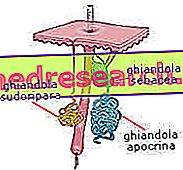Definition
Trigeminal neuralgia is a chronic neuropathic disorder characterized by intense facial pain in areas innervated by the fifth cranial nerve, otherwise known as a trigeminal nerve.
The trigeminal innervates both the right side and the left side of the face. However, it is rare for patients suffering from trigeminal neuralgia to experience pain on both sides of the face. In most cases, in fact, the pain is one-sided.
If not adequately treated, trigeminal neuralgia worsens more and more over time, affecting in a very negative way the life of patients who suffer from it.
Causes
In most cases, trigeminal neuralgia is triggered by a compression of the trigeminal nerve itself, caused by contact between the latter and a blood vessel that runs near it. Repeated compression can cause erosion of the myelin sheath that lines the nerve, thus causing an alteration in the conduction of nerve impulses.
The damage to the myelin sheath, however, can also be caused by other diseases and disorders such as, for example, multiple sclerosis, some blood vessel abnormalities such as aneurysms, cyst formation, stroke, neoplastic diseases or complications following infections sustained by Shingles .
The attack of neuralgia can be triggered by simple actions, such as talking, chewing or brushing your teeth.
Symptoms
The symptom that characterizes trigeminal neuralgia is that sudden and intense pain that affects certain areas of the face, such as the jaw, cheek, upper jaw, eye or forehead.
Furthermore, tingling and / or numbness may also occur before the onset of pain. The duration of the nerve attack can vary from a few seconds to two minutes, or it can repeat several times during the day.
Other symptoms that may occur in patients suffering from trigeminal neuralgia are tinnitus, ear pain, eye pain, photophobia, pain during chewing, paraesthesia and muscle spasms.
Finally, in some cases, trigeminal neuralgia can affect the patient's life in such a negative way that it favors the development of depression.
Information on Trigeminal Neuralgia - Drugs and Cures is not intended to replace the direct relationship between health professional and patient. Always consult your doctor and / or specialist before taking Trigeminal Neuralgia - Drugs and Cures.
drugs
The first-line treatment for trigeminal neuralgia is pharmacological. The drugs that are usually prescribed are anticonvulsants and antidepressants, as they are particularly effective in treating neuropathic pain.
In cases where the pharmacological treatment is ineffective and in more serious cases, however, the doctor may decide to resort to surgery, intervening on the blood vessels that exert compression on the trigeminal nerve.
If the neuralgia is caused by other diseases or disorders, then it is necessary to treat the primary cause that caused the onset of the disorder.

Anticonvulsants
The anticonvulsants are drugs normally used in the therapy of epilepsy, but which are particularly useful also in treating neuropathic pain. In fact, anticonvulsants are the first choice treatment for patients suffering from this disorder. However, due to the side effects that these drugs can cause, their use should only take place under the strict control of the doctor.
Among the active ingredients most used, we recall:
- Carbamazepine (Tegretol ®): carbamazepine is the most used anticonvulsant in the treatment of trigeminal neuralgia. It is available for oral administration in the form of tablets. The initial dose usually used in adults is 200-400 mg of drug per day. This dose can be increased until the pain has disappeared and then reduced again, so as to achieve the lowest effective dose to maintain control of symptoms. In elderly patients, on the other hand, lower doses of medication are given.
- Gabapentin (Neurontin ®): for the treatment of neuropathic pain, the initial dose of gababentin that is usually administered is 300-900 mg a day. Afterwards, the doctor may decide to increase the dose of the drug administered, until reaching the most adequate maintenance dose for each patient.
Tricyclic antidepressants
Tricyclic antidepressants may also be useful in trigeminal neuralgia treatment, but are often used to treat depression that may occur in association with neuropathic pain.
Among these drugs, we recall:
- Amitriptyline (Laroxyl ®): the initial dose of amitriptyline usually used for the treatment of neuropathic pain is 12.5-25 mg per day. Subsequently, the doctor can increase the dose of the drug to be taken, until reaching the optimal maintenance dosage for each individual patient.



